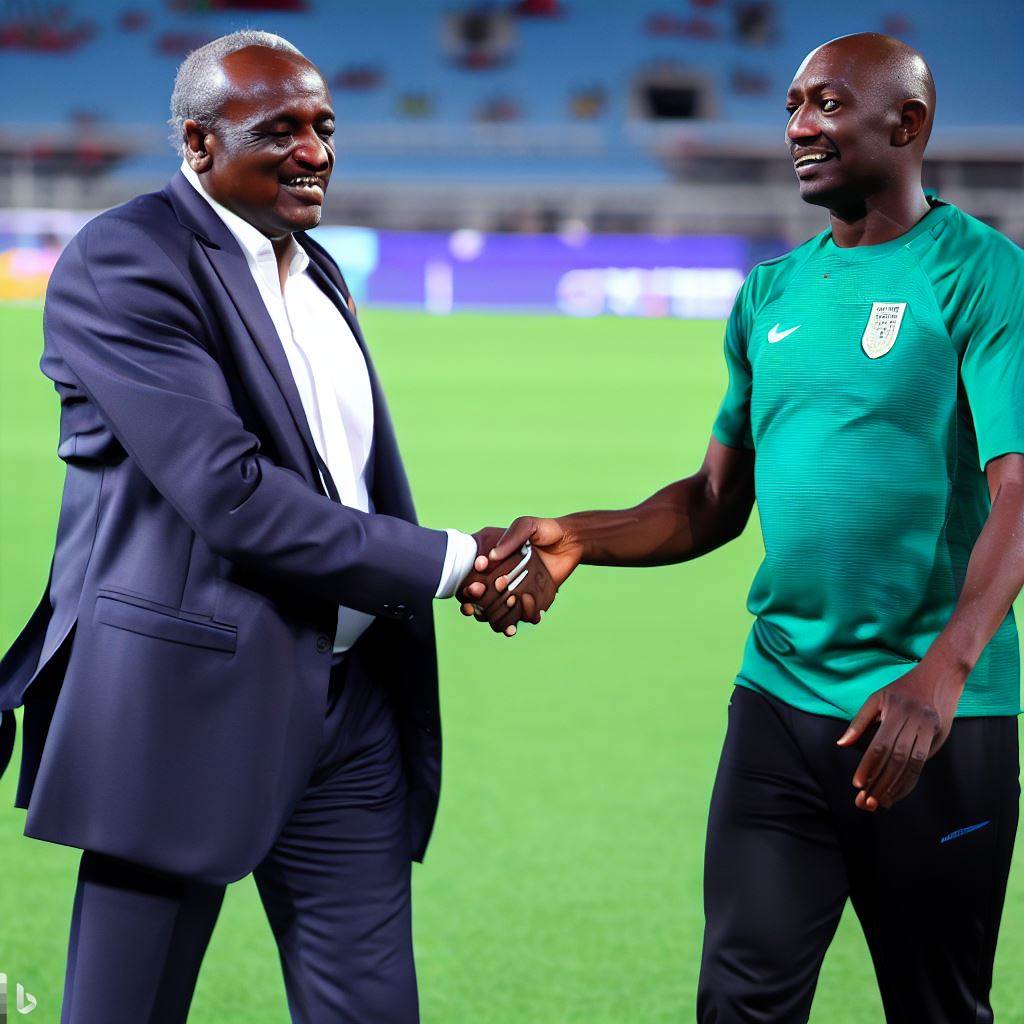Networking Tips for Assistant Coaches in Nigeria
Last Updated on September 5, 2023
Introduction
In the world of sports coaching, assistant coaches play a crucial role in supporting and enhancing the performance of the main coach.
They are responsible for various tasks, such as analyzing opponents’ strategies, coordinating team practices, and mentoring players.
Assistant coaches in Nigeria are particularly integral to the success of their teams, as they provide valuable support in a highly competitive sporting landscape.
They assist in talent identification, skill development, and teamwork, all while fostering a positive and motivating environment for the athletes.
Networking is an essential aspect of career growth for assistant coaches in Nigeria as it allows them to establish meaningful connections within the sports community.
Networking provides the opportunity to meet influential individuals, such as head coaches, recruiters, and administrators, who can open doors to new opportunities.
By actively networking, assistant coaches can gain exposure to different coaching methods, strategies, and philosophies, ultimately expanding their knowledge and enhancing their coaching capabilities.
They can also stay up-to-date with the latest trends in the industry, which is crucial for staying competitive and relevant in a dynamic field like coaching.
Networking also serves as a platform for sharing experiences, challenges, and successes with other coaches, creating a supportive and collaborative community.
Building relationships with fellow coaches can lead to partnerships, recommendations, and referrals, further bolstering career prospects.
In addition, assistant coaches in Nigeria play a vital role in the success of their teams, and networking is a powerful tool for their career growth.
By actively engaging in networking opportunities, assistant coaches can expand their knowledge, gain exposure, and forge valuable connections that can lead to exciting new career prospects in the coaching field.
Understanding the Nigerian Coaching Landscape
When it comes to being an assistant coach in Nigeria, it is essential to understand the coaching landscape of the country.
Nigerian football has a rich history and is highly celebrated, but it also faces unique challenges that coaches need to be aware of.
The Current State of Coaching in Nigeria
- Nigeria is passionate about football, with a strong focus on the national team, the Super Eagles.
- Despite the passion, Nigerian football has struggled with issues such as corruption, inadequate infrastructure, and poor funding.
- Coaching in Nigeria is highly competitive, with a limited number of professional coaching positions available.
- There is a need for well-qualified and dedicated assistant coaches who can contribute to the development of Nigerian football.
Levels and Leagues for Assistant Coaches
Assistant coaches in Nigeria have different levels and leagues available to them, depending on their qualifications and experience.
1. Professional Football League (NPFL)
- The NPFL is the highest level of professional football in Nigeria.
- Assistant coaches in NPFL teams work with head coaches to help develop strategies and train players.
- They also play a crucial role in match analysis and scouting opponents.
2. National Teams
- Nigeria has various national teams at different levels, including the senior national team, youth teams, and women’s teams.
- Assistant coaches in national teams assist the head coach in training players and developing game plans.
- They are responsible for identifying talented players and providing guidance and support throughout tournaments.
3. Youth Development Academies
- Nigeria has numerous youth development academies that focus on nurturing young talent.
- Assistant coaches in these academies help identify and train young players, providing them with the skills needed to excel.
- They play a crucial role in shaping the future of Nigerian football by developing talented individuals.
Requirements and Expectations
To succeed as an assistant coach in Nigeria, certain requirements and expectations need to be met.
1. Qualifications and Certifications
- Having the necessary coaching certifications is essential for assistant coaches in Nigeria.
- Coaches should acquire relevant qualifications from recognized coaching bodies or football associations.
2. Experience and Expertise
- Assistant coaches should have practical experience working in different coaching roles.
- They should possess a deep understanding of various coaching methodologies and be able to apply them effectively.
3. Leadership and Communication
- Assistant coaches need to demonstrate strong leadership skills and the ability to communicate effectively.
- They should be able to motivate and inspire players to perform at their best.
4. Adaptability and Resilience
- Coaches in Nigeria need to be adaptable and resilient due to the challenging conditions they may encounter.
- They should be able to handle pressure and make quick decisions in high-stakes situations.
Lastly, being an assistant coach in Nigeria is a rewarding but challenging endeavor.
Understanding the Nigerian coaching landscape, the different levels and leagues available, and the requirements and expectations is crucial for success.
By embracing these insights, assistant coaches can contribute to the development and growth of Nigerian football.
Read: Top Skills Required for Assistant Coaches in Nigeria
Build a strong online presence
Building a strong online presence is crucial for assistant coaches in Nigeria. With the advancement of technology, networking has never been easier.
Here are some tips to help assistant coaches in Nigeria make the most of social media platforms for networking:
1. Create Professional Social Media Profiles
- Use a professional profile picture and cover photo that showcase your coaching expertise.
- Include a clear and concise bio that highlights your coaching experience, skills, and achievements.
- Share valuable content related to coaching on a regular basis to showcase your knowledge and expertise.
2. Engage with the Coaching Community
- Join coaching forums and online communities specific to Nigeria to connect with fellow coaches.
- Participate actively in discussions, share insights, and ask questions to establish yourself as a knowledgeable and engaged coach.
- Interact with other coaches’ posts by liking, sharing, and commenting, which can lead to valuable connections.
3. Utilize LinkedIn for Professional Networking
- Create a comprehensive LinkedIn profile highlighting your coaching experience and skills.
- Connect with other coaches, recruiters, and professionals in the sports industry to expand your network.
- Engage with relevant LinkedIn groups and share your insights to increase your visibility within the coaching community.
4. Leverage Twitter for Real-Time Networking
- Follow influential coaches, sports organizations, and relevant hashtags to stay updated with the latest coaching trends and news.
- Engage in conversations, share valuable content, and retweet relevant posts to establish yourself as a knowledgeable coach in your field.
- Utilize Twitter chats related to coaching to connect with like-minded professionals and discuss relevant topics.
5. Showcase Your Expertise through Blogging
- Start a coaching blog where you share valuable tips, insights, and experiences.
- Promote your articles on your social media platforms to reach a wider audience.
- Interact with your readers through comments and encourage discussions to build meaningful connections.
6. Attend Coaching Conferences and Workshops
- Participate in coaching conferences and workshops to network with industry experts and fellow coaches.
- Engage in conversations and exchange contact information with attendees to expand your network.
- Be active in post-event discussions on social media platforms to maintain connections and further networking opportunities.
Networking is a crucial aspect for assistant coaches in Nigeria, and social media platforms provide an excellent opportunity to connect with other coaches, recruiters, and professionals in the sports industry.
By building a strong online presence, assistant coaches can enhance their career prospects and stay updated with the latest trends in coaching. Implement these tips to take your networking game to the next level!
Read: Assistant Coach: A Key to Nigerian Basketball Rise

Attend coaching conferences and workshops
As an assistant coach in Nigeria, it is essential to constantly enhance your professional network.
Networking can open doors to new opportunities, connections, and knowledge that can help you excel in your coaching career.
Here are some valuable tips for assistant coaches to maximize their networking opportunities in Nigeria:
Attend Coaching Conferences and Workshops
One effective way to expand your network is by attending coaching conferences and workshops.
These events bring together coaches from different backgrounds and provide a platform for learning, sharing experiences, and making connections.
The significance of attending industry events cannot be underestimated.
Significance of Attending Industry Events
Attending industry events allows you to stay updated with the latest coaching trends, techniques, and technologies.
It provides a unique opportunity to gain insights from established coaches, industry leaders, and influential speakers.
You can learn from their experiences and apply their knowledge to your coaching practices.
List of Popular Coaching Conferences in Nigeria
- Nigeria Coaching Conference (NCC)
- Coaching Nigeria Summit (CNS)
- International Sports Coaching Conference Nigeria (ISCCN)
- Nigeria Football Coaches Association Conference (NFCA)
These conferences attract coaches, professionals, and experts from various coaching disciplines, offering a diverse networking platform.
Maximizing Networking Opportunities During These Events
To make the most out of these conferences and workshops, consider the following tips:
- Prepare in Advance: Research the speakers, topics, and attendees to identify potential connections and topics of interest.
- Actively Participate: Engage in discussions, ask questions, and share your thoughts to make yourself visible and memorable.
- Exchange Contact Information: Carry business cards and be prepared to share them with fellow coaches, speakers, and industry professionals.
- Follow Up: After the event, reach out to the connections you made, send a personalized message, and express your interest in staying connected.
- Utilize Social Media: Join coaching groups, follow coaching organizations on social media, and actively participate in online discussions to expand your network further.
- Mentorship Opportunities: Networking events can also provide opportunities for finding mentors or becoming a mentor yourself. Foster relationships based on mutual growth and support.
- Attend Social Gatherings: Networking opportunities often exist outside the official sessions. Attend social gatherings, welcome receptions, or networking dinners to meet and connect with other coaches in a relaxed environment.
Building an extensive network requires time, effort, and consistency.
It is not only about collecting business cards but also about fostering meaningful relationships with fellow coaches and industry professionals.
Remember, networking is a continuous process, and by actively participating in coaching conferences and workshops, you can create a strong support system and advance your coaching career in Nigeria.
Read: Networking in Nigeria: Assistant Athletic Trainer Tips
Engage in mentorship programs and coaching clinics
Participating in mentorship programs and coaching clinics is crucial for Nigerian assistant coaches.
These opportunities offer valuable advantages, improve coaching skills, and provide networking chances with seasoned professionals.
Mentorship significantly aids assistant coaches’ development by offering insights into effective coaching techniques, leadership, and career guidance. Such guidance refines coaching methods and career navigation.
In Nigeria, various mentorship programs exist for aspiring assistant coaches.
Notably, the Nigeria Football Federation (NFF) Coaching Education Program pairs young coaches with experienced national team coaches and experts.
The Sports Coaching Development Program by the Sports Commission of Nigeria enhances coaches’ skills through expert-led mentorship sessions.
Coaching clinics are equally vital. The Nigeria Coaches Association organizes clinics throughout the year, focusing on specific sports.
These clinics facilitate skill development, shared experiences, and network expansion.
Additionally, attending international sports organizations’ coaching clinics encourages cultural exchange and exposure to diverse coaching styles.
Participation in mentorship programs and coaching clinics grants Nigerian assistant coaches valuable experience, skill improvement, and an expanded professional network.
Actively seeking these opportunities is essential for career advancement.
In summary, mentorship and coaching clinics are vital for Nigerian assistant coaches, offering guidance, skill enhancement, and networking chances for successful coaching careers.
Read: Work-Life Balance: Assistant Athletic Trainer in Nigeria
Develop relationships with fellow coaches
Importance of establishing relationships with other coaches
In the dynamic world of coaching, forming strong connections with fellow coaches is paramount. Here’s why:
- Knowledge Sharing: Collaborating with other coaches broadens your horizons, exposes you to diverse coaching philosophies, and helps you learn new techniques.
- Resource Pooling: Building relationships with other coaches in Nigeria creates a resource-sharing network that can be invaluable when you need assistance, advice, or even equipment.
- Professional Growth: Networking opens doors to opportunities for professional development, workshops, and seminars that can enhance your coaching skills.
- Mentorship: Experienced coaches can serve as mentors, providing guidance and insights to help you navigate the challenges of coaching.
- Job Opportunities: Well-established relationships can lead to job referrals or recommendations, which can be crucial in the competitive coaching field.
Tips on networking with fellow assistant coaches
- Attend Coaching Conferences: Participate in conferences, workshops, and seminars to meet coaches from various backgrounds and levels.
- Online Communities: Join social media groups or forums related to coaching, especially those specific to Nigeria, to engage in discussions and share your experiences.
- Local Coaching Associations: Become a member of local coaching associations or clubs to connect with coaches in your region.
- Initiate Conversations: Don’t hesitate to strike up conversations with fellow coaches during games, events, or even at local training facilities.
- Collaborative Projects: Collaborate on coaching projects, such as organizing youth tournaments or coaching clinics, to bond with other coaches.
- Share Resources: Offer your knowledge, training drills, or coaching materials to fellow coaches, fostering a culture of reciprocal assistance.
By developing meaningful relationships with fellow coaches, you not only enrich your coaching journey but also contribute to the growth and development of the coaching community in Nigeria.
These connections will not only benefit you but also the athletes you coach.
Stay up-to-date with coaching trends and advancements
Networking is an essential aspect of professional development for assistant coaches in Nigeria.
By establishing and nurturing relationships with other coaches, you can gain valuable knowledge and insights that can help you improve your coaching skills.
Here are some networking tips to enhance your career:
- Regularly attend coaching conferences and seminars to learn about the latest trends in the field.
- Engage in conversations with fellow coaches to exchange ideas and experiences.
- Follow coaching organizations and influencers on social media platforms to stay informed.
Significance of continuous learning in coaching
- Recognize that coaching is a dynamic profession that requires ongoing education.
- Seek out mentorship opportunities with experienced coaches who can provide guidance and support.
- Participate in workshops or training sessions to enhance your coaching skills.
Read coaching books, articles, and blogs
- Expand your knowledge by reading books written by renowned coaches.
- Stay updated on the latest coaching techniques through articles and write-ups.
- Join online communities or forums where coaching professionals discuss relevant topics.
Attend coaching webinars or taking online courses
- Attend webinars conducted by experts in the coaching industry.
- Opt for online courses that focus on specific coaching areas you want to develop.
- Engage in virtual discussions or forums during webinars to connect with fellow coaches.
Networking is not just about gaining knowledge; it also encompasses building relationships and fostering a supportive community.
Here are additional tips to help you establish meaningful connections:
- Connect with coaches from different sports backgrounds to gain diverse perspectives.
- Attend local sporting events and introduce yourself to coaches from various teams.
- Participate in coaching forums or groups on social media platforms to engage with like-minded individuals.
- Reach out to coaches you admire and express your interest in learning from them.
- Consider organizing networking events for assistant coaches in your area to create a platform for collaboration.
- Be an active listener and show genuine interest in others’ experiences and ideas.
- Share your own expertise and insights with fellow coaches to contribute to the community.
- Follow up with new connections by sending personalized emails or connecting on professional networking platforms.
To sum it up , networking is an invaluable tool for assistant coaches in Nigeria.
By staying updated with coaching trends, emphasizing continuous learning, and actively engaging with other coaches, you can enhance your coaching skills and build a supportive professional network.
Remember, networking is a two-way street, so make sure to contribute to the community and offer support to fellow coaches.
Conclusion
Networking is crucial for assistant coaches in Nigeria as it opens doors for opportunities and growth.
By implementing the key tips discussed, such as attending events and utilizing social media, assistant coaches can successfully expand their network.
It is important for assistant coaches to take actionable steps towards building their networks, such as reaching out to others and maintaining meaningful connections.
Networking not only allows coaches to exchange knowledge and experiences but also helps in finding new job prospects and career advancements.
In a competitive industry, having a strong network can give assistant coaches an edge and increase their chances of success.
Therefore, it is vital for assistant coaches to prioritize networking and continuously work on building and nurturing their relationships.
By being proactive and investing time and effort into networking, assistant coaches can create a strong support system and open doors to new opportunities in their coaching careers.
Ultimately, networking is a powerful tool that can significantly contribute to the success and growth of assistant coaches in Nigeria.


